High Confidence Biomarker Identification for Precision Discovery With Platinum®
Now you can interrogate disease biomarkers using the advanced Next-Generation Protein Sequencer™, Platinum®.
Request More InfoWhy Choose Platinum®?
Harnessing single-molecule sequencing and seamless workflow integration, Quantum-Si’s Platinum provides more insights while bringing advanced proteomics into your lab.
Learn More About PlatinumExplore our application notes to discover how Platinum’s Next-Generation Protein Sequencing detects proteins with confidence
-
Quantum-Si’s Next Generation Protein Sequencing Technology Enables Rapid and Accurate Distinction of Variants of the SARS-CoV-2 Virus – APP NOTE
The application note highlights Quantum-Si’s protein sequencing technology on the Platinum instrument for swift and accurate differentiation of SARS-CoV-2 variants based on the amino acid sequences of their Spike proteins. This identification and monitoring of variants facilitate a better understanding of their public health impact and contribute to the development of effective treatments and vaccines.
Download the application note to learn more about this groundbreaking technology.
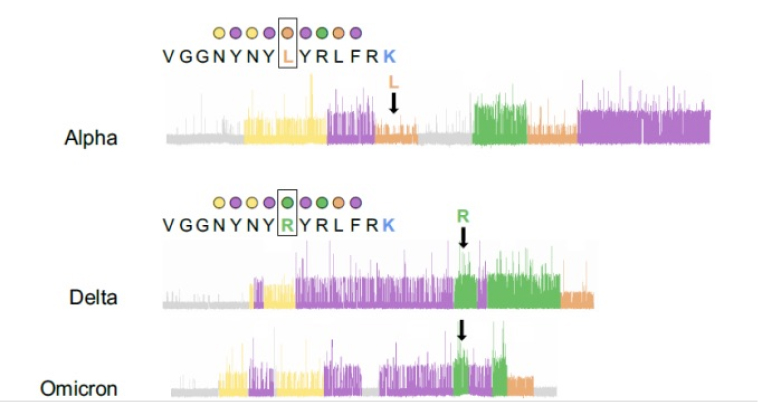
By scrutinizing a critical mutation, we identified distinct kinetic impacts on the binding of recognizers. These disparities in pulse durations (PD) effectively illustrate the Platinum instrument’s proficiency in differentiating among the Alpha, Delta, and Omicron variants through the lens of a single mutational change.
In this analysis, we focus on isolating the Omicron variant from the Alpha and Delta variants by identifying a singular, characteristic peptide. This specialized capability augments the accuracy and precision with which SARS-CoV-2 variants can be differentiated using Quantum-Si’s Platinum instrument.

-
Enrichment and Sequencing of Albumin Protein from Urine – APP NOTE
In this application note, we investigate the amplification and analysis of albumin protein derived from urine through the Platinum cutting-edge protein sequencing system. Albumin stands as a vital signpost for detecting illnesses, and urine acts as a hassle-free and immediate source for overseeing patient health. This guide presents a method that integrates affinity-centric amplification with Quantum-Si’s advanced protein sequencing to detect and profile albumin peptides.
Download the application note to uncover more about this innovative approach to studying biomarkers and protein discrepancies in bodily fluids.

Here, we depict the protein sequence of HSA following LysC digestion. These results highlight the precision of the Platinum workflow in correctly pinpointing and charting albumin peptides.
The patterns observed for each HSA peptide, as determined by the software analysis system, correspond to the fluorescence signals captured during sequencing. By scrutinizing these patterns, we could delve deeper into the sequencing data and confirm the precision of the peptide recognition.

-
Immunoprecipitation of IL-6 from Human Serum for Next-Generation Protein Sequencing™ on Platinum – APP NOTE
The application note delves into the enrichment of low-abundant proteins from intricate biological matrices, a pivotal step in many proteomic workflows. It introduces an innovative immunoprecipitation protocol that aligns with Quantum-Si’s next-gen protein sequencing workflow. By bypassing the sample elution step, this on-bead digestion protocol directly prepares digested peptide libraries. The effectiveness of this method is showcased through the enrichment of IL-6 from human serum, followed by its sequencing and identification using Platinum.
Understand the potential of this groundbreaking immunoprecipitation protocol by downloading the full application note today.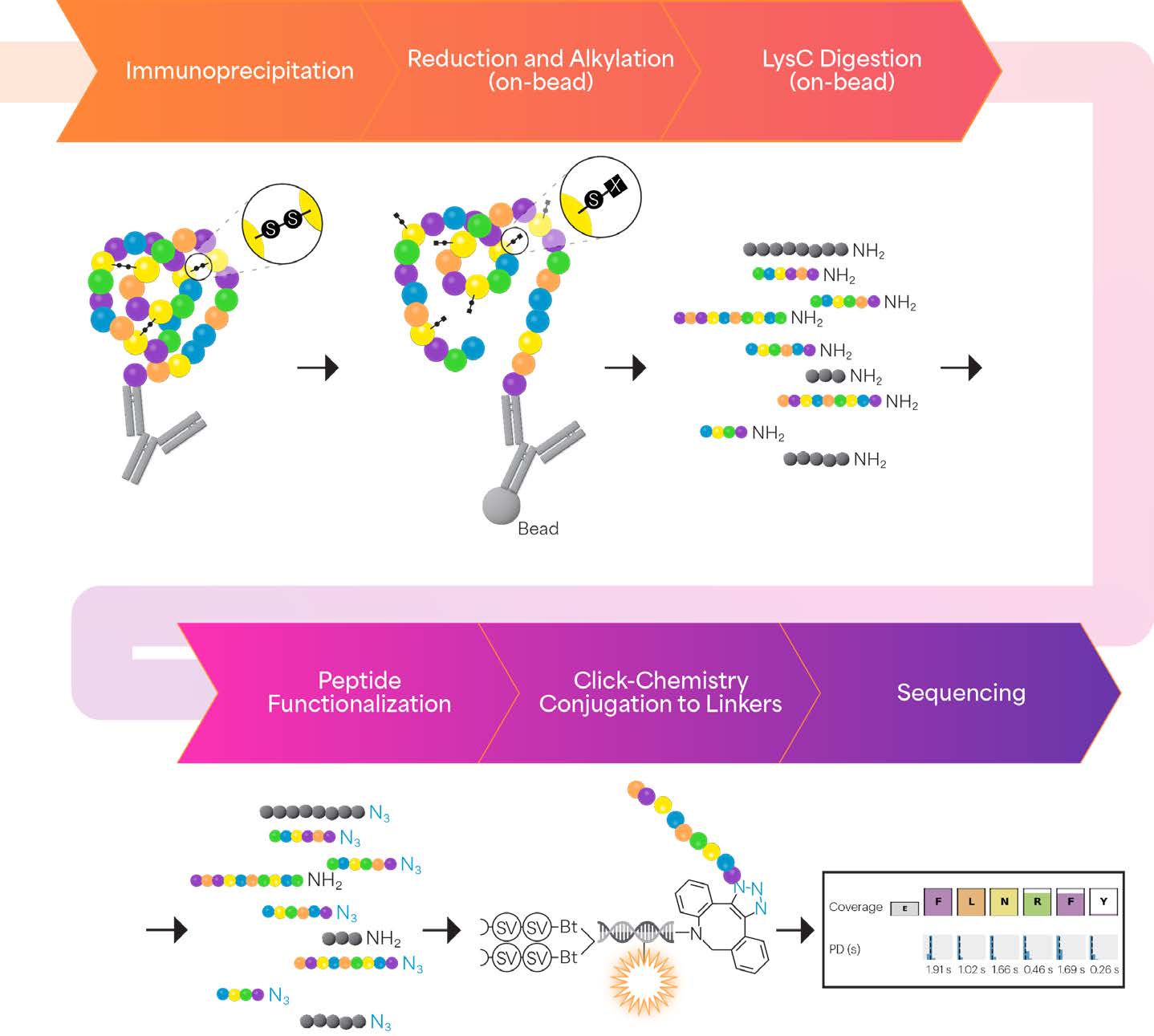
The application note highlights a comprehensive workflow for on-bead digestion and immunoprecipitation of proteins, paving the way for next-generation protein sequencing™. This step-by-step process emphasizes the seamless transition from protein capture to its preparation for advanced sequencing, highlighting the efficiency and innovation of the approach.
Here we showcase the intricate details of the traces, coverage, and pulse duration data for the peptides identified in IL-6 immunoprecipitated from PBS. Utilizing five recognizers, the study successfully identifies 12 amino acids, leading to the recognition of three distinct peptides.
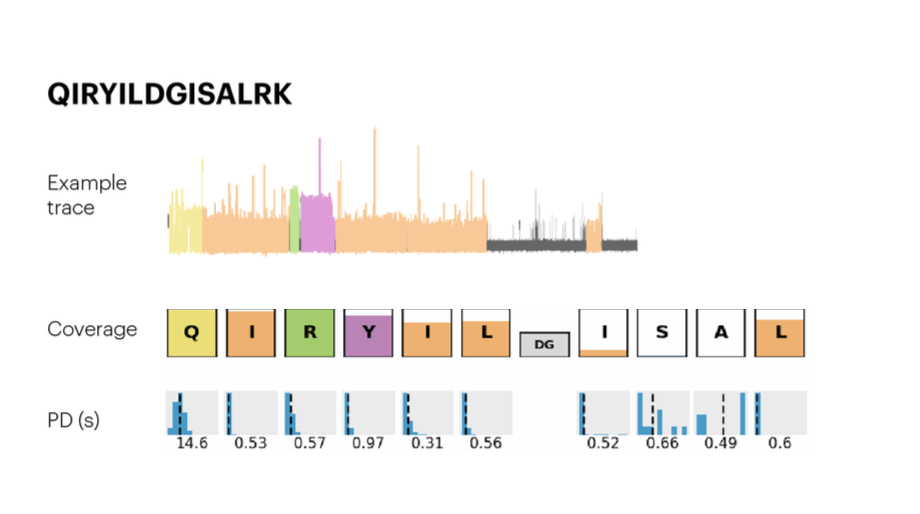
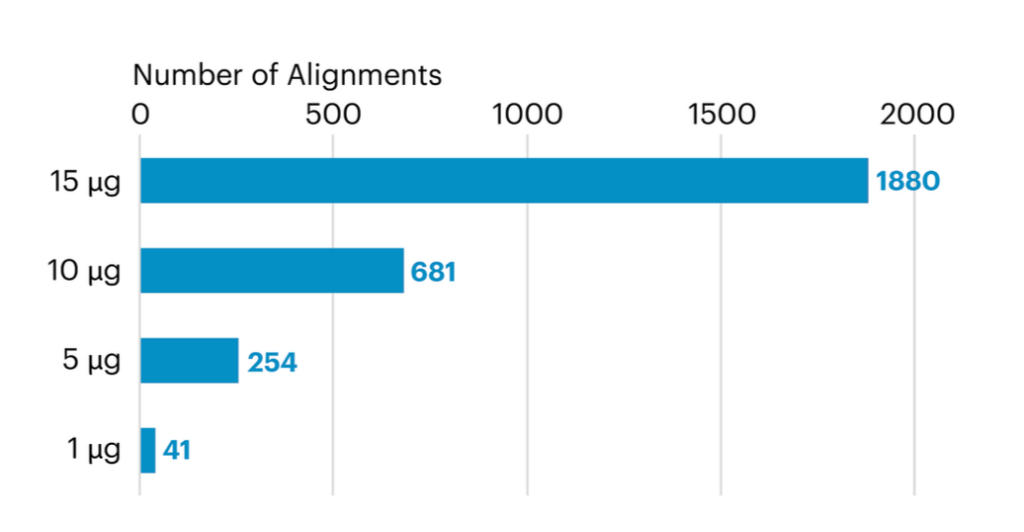
This compelling analysis presents the number of aligned IL-6 peptides discovered in each immunoprecipitated serum sample. This data not only underscores the efficiency of the method but also offers insights into the relationship between input concentration and sequencing outcomes.
-
Identifying Monoclonal Antibodies with Quantum-Si’s Next-Generation Protein Sequencing™ Technology – APP NOTE
Identifying low-abundance monoclonal antibodies within a polyclonal antibody population is crucial for understanding disease mechanisms, diagnostics, and more. Traditional methods, while useful, often come with high costs, complexity, and time-consuming procedures. This application note introduces Quantum-Si’s next-generation protein sequencing™ technology on the Platinum instrument, a solution that addresses these challenges and efficiently identifies these critical antibodies.
Discover the breakthrough methodology and its potential impact by downloading the full application note.
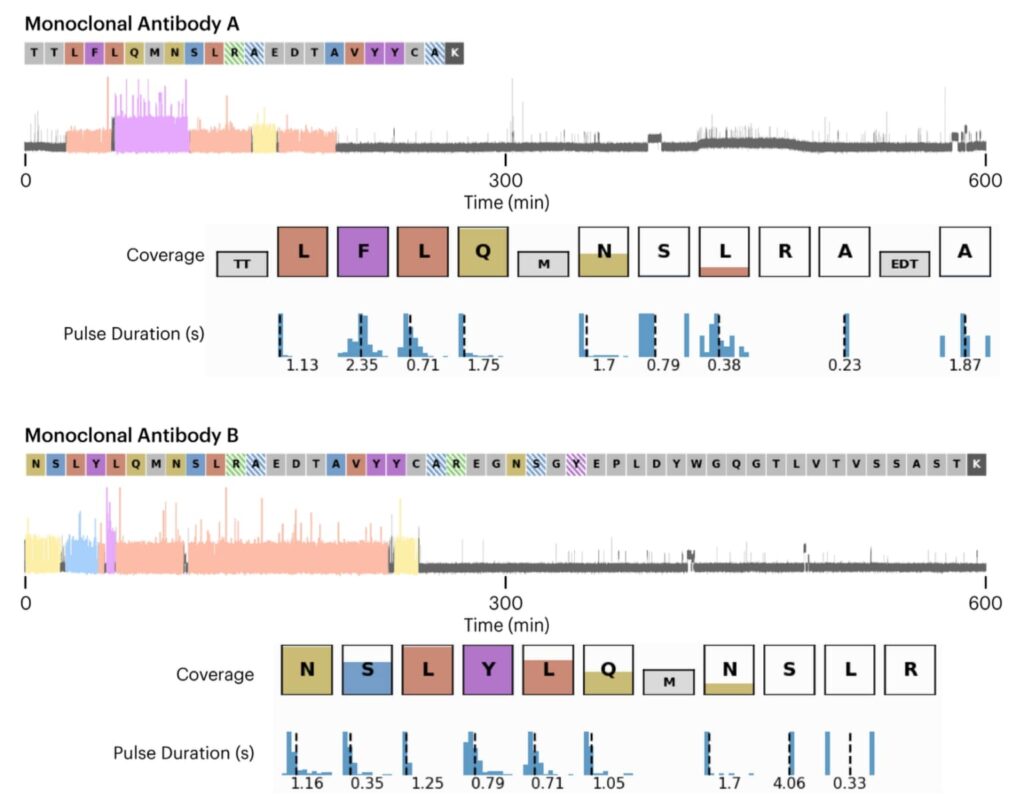
Here we showcase the sequencing data of unique peptides derived from two distinct monoclonal antibodies. The data, collected over a 10-hour period, displays the recognition segments (RS) with their coverage indicated by the color height in each box, alongside the pulse duration distribution. This visualization effectively demonstrates the Platinum instrument’s capability to accurately sequence and identify specific peptides unique to each antibody.